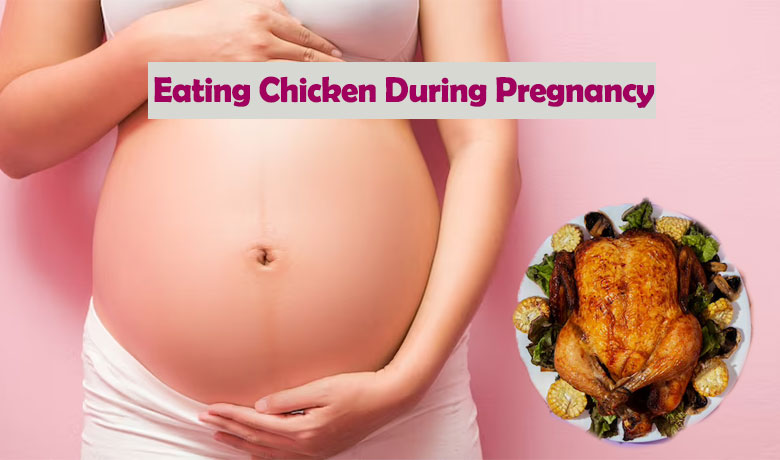Eating Chicken During Pregnancy

Pregnancy is a crucial period during which maintaining a healthy and balanced diet is essential for both the mother and the developing fetus. Protein-rich foods, such as chicken, play a vital role in meeting the increased nutritional requirements during pregnancy. This comprehensive review aims to provide evidence-based insights into the benefits and considerations of consuming chicken during pregnancy, including its nutritional composition, potential health risks, cooking recommendations, and overall impact on maternal and fetal health.
During pregnancy, adequate protein intake is essential for the growth and development of the fetus, as well as the health and well-being of the mother. Chicken, being a lean and versatile protein source, can be an excellent addition to a balanced prenatal diet. This section provides an overview of the importance of protein during pregnancy and the role of chicken in meeting these dietary needs.
Nutritional Composition of Chicken
Chicken is rich in essential nutrients, including high-quality protein, vitamins, and minerals. This section discusses the nutritional composition of chicken, highlighting its protein content, amino acid profile, vitamins (such as B vitamins and vitamin D), and minerals (such as iron and zinc) that are particularly relevant during pregnancy.
Benefits of Consuming Chicken during Pregnancy
- Protein and amino acids: Chicken provides essential amino acids required for fetal growth and development, as well as maternal tissue repair and maintenance.
- Iron: Chicken is a good source of heme iron, which is more easily absorbed by the body compared to non-heme iron. Adequate iron intake helps prevent iron deficiency anemia, a common condition during pregnancy.
- Vitamin B complex: Chicken contains various B vitamins, including niacin, riboflavin, and B12, which are crucial for energy production, neural tube development, and red blood cell formation.
- Choline: Chicken is a natural source of choline, which plays a vital role in brain development and cognitive function.
Considerations and Precautions
- Food safety: Pregnant women are more susceptible to foodborne illnesses. This section highlights important considerations for handling, storing, and cooking chicken to minimize the risk of bacterial contamination.
- Antibiotic use: It is important to choose chicken products that are sourced responsibly and free from unnecessary antibiotics, as excessive antibiotic consumption may have potential implications during pregnancy.
- Allergies and sensitivities: Some individuals may have allergies or sensitivities to chicken or its components. This section provides information on identifying and managing potential allergic reactions.
Cooking Recommendations
Proper cooking techniques are essential to ensure the safety and palatability of chicken dishes during pregnancy. This section discusses recommended cooking temperatures, avoiding undercooked poultry, and suggestions for healthy and flavorful meal preparations.
Is it good to eat chicken during pregnancy?
Yes, it is generally considered safe and beneficial to eat chicken during pregnancy. Chicken is a valuable source of high-quality protein, essential vitamins, and minerals that are important for the healthy development of both the mother and the growing fetus.
Can I eat chicken in 1st trimester?
Yes, you can eat chicken during the first trimester of pregnancy. In fact, including chicken as part of a balanced diet can provide essential nutrients that are beneficial for both you and your developing baby. However, it’s important to follow proper food safety practices and cooking guidelines to minimize the risk of foodborne illnesses.
During the first trimester, the fetus undergoes critical development, and proper nutrition is crucial. Chicken is a good source of protein, which is essential for the growth and development of cells, tissues, and organs. It also contains important vitamins and minerals like iron, zinc, and B vitamins, which support various physiological processes.
To ensure the safety of consuming chicken during pregnancy, consider the following guidelines:
- Choose fresh chicken: Select fresh chicken from a reliable source. Check the expiration date and ensure that the meat is properly stored and refrigerated.
- Practice good hygiene: Wash your hands thoroughly with soap and water before and after handling raw chicken. This helps prevent the spread of bacteria.
- Avoid cross-contamination: Keep raw chicken separate from other foods, especially fruits, vegetables, and ready-to-eat items, to prevent potential cross-contamination.
- Cook chicken thoroughly: Ensure that chicken is cooked to a safe internal temperature to kill any harmful bacteria. The recommended internal temperature for cooked chicken is 165°F (74°C). Use a food thermometer to check the doneness.
Store leftovers properly: If you have leftover cooked chicken, refrigerate it promptly and consume it within a few days to maintain its freshness and minimize the risk of bacterial growth.
If you have any specific dietary concerns or medical conditions, it is advisable to consult with your healthcare provider or a registered dietitian for personalized advice regarding your diet during the first trimester of pregnancy. They can provide you with guidance tailored to your individual needs and circumstances.
Can pregnant ladies eat KFC chicken?
Pregnant women can consume KFC chicken or any other type of commercially prepared chicken, but there are some important considerations to keep in mind:
Food Safety:
Ensure that the chicken from KFC or any other fast food chain is handled, cooked, and stored properly to minimize the risk of foodborne illnesses. It’s important to choose establishments with good hygiene practices and reputable food safety standards.
Cooking Temperature:
Make sure that the chicken is cooked thoroughly to a safe internal temperature. The recommended internal temperature for cooked chicken is 165°F (74°C). This ensures that any potentially harmful bacteria are killed.
Sodium and Fat Content:
Fast food chicken products, including those from KFC, may be high in sodium and fat. While moderate consumption is generally fine, it’s important to be mindful of your overall dietary intake. High sodium intake should be avoided, as it can contribute to fluid retention and potentially increase the risk of high blood pressure.
Nutritional Balance:
It’s essential to maintain a balanced and varied diet during pregnancy. While KFC chicken can be a part of your diet occasionally, it should not replace nutrient-dense foods such as fruits, vegetables, whole grains, and lean protein sources that provide a wide range of essential vitamins, minerals, and fiber.
Personal Preferences and Tolerance:
Some pregnant women may experience changes in taste preferences or develop food aversions. If you have specific dietary preferences or sensitivities, you may want to consider alternative options or customize your meal choices at KFC to meet your nutritional needs.
Remember, it’s always a good idea to consult with your healthcare provider or a registered dietitian for personalized advice on your specific dietary requirements during pregnancy. They can provide guidance based on your individual circumstances and any specific dietary considerations you may have.
What meat is good for pregnancy?
Several types of meat are considered good choices for pregnancy due to their nutritional content. Here are some meats that are generally recommended for pregnant women:
- Lean Beef: Lean cuts of beef, such as sirloin or tenderloin, provide high-quality protein, iron, zinc, and B vitamins.
- Pork: Lean cuts of pork, such as tenderloin or loin chops, are a good source of protein, iron, and B vitamins. Avoid processed or cured pork products, such as hot dogs or deli meats, unless they are heated until steaming hot to reduce the risk of foodborne illnesses.
- Poultry (Chicken and Turkey): Skinless chicken and turkey breast are lean protein options that provide essential amino acids, vitamins, and minerals. Ensure thorough cooking to eliminate any bacteria.
- Fish and Seafood: Fish and seafood can be an excellent source of omega3 fatty acids, which are beneficial for the development of the baby’s brain and eyes. Opt for low-mercury fish such as salmon, trout, shrimp, and catfish. Avoid high-mercury fish like sharks, swordfish, king mackerel, and tilefish.
- Lamb: Lean cuts of lamb, such as loin or leg, are a good source of protein, iron, and B vitamins. Make sure the lamb is properly cooked to eliminate any potential bacteria.
When consuming meat during pregnancy, it’s essential to follow safe food handling practices, cook meats to the recommended internal temperatures, and avoid cross-contamination with other foods.
It’s worth noting that dietary preferences, cultural considerations, and individual health conditions may influence your choices. Consulting with your healthcare provider or a registered dietitian is always recommended to tailor your diet to your specific needs and ensure a healthy and balanced nutrition plan during pregnancy.
Does eating chicken affect pregnancy?
Eating chicken, when prepared and handled properly, does not generally have any adverse effects on pregnancy. In fact, chicken can be a nutritious and beneficial part of a balanced diet during pregnancy. It provides essential nutrients such as protein, vitamins, and minerals that support the growth and development of both the mother and the fetus.
Conclusion
Consuming chicken as part of a well-balanced diet during pregnancy can provide numerous nutritional benefits. It is an excellent source of high-quality protein, essential vitamins, and minerals that support the growth and development of the fetus, as well as the overall health of the mother.
However, it is crucial to adhere to proper food safety practices and make informed choices when selecting chicken products. By considering these factors, pregnant women can confidently incorporate chicken into their diet, promoting a healthy and nourishing pregnancy.
